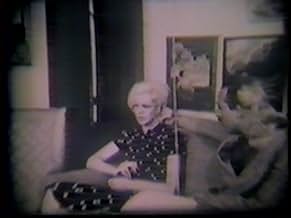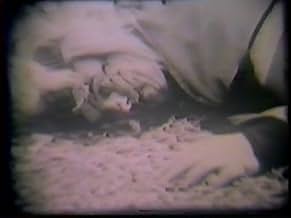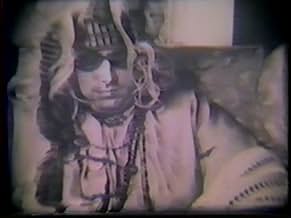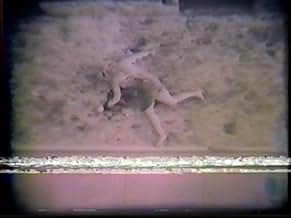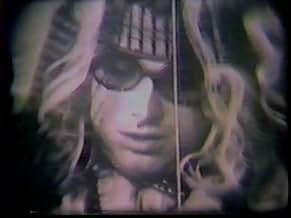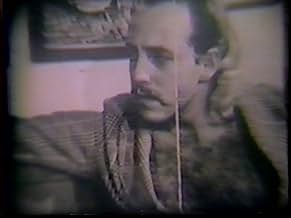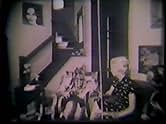Ajouter une intrigue dans votre langueA John Waters film where Divine plays Diane Linkletter, daughter of Art Linkletter and commits suicide.A John Waters film where Divine plays Diane Linkletter, daughter of Art Linkletter and commits suicide.A John Waters film where Divine plays Diane Linkletter, daughter of Art Linkletter and commits suicide.
- Réalisation
- Scénario
- Casting principal
Avis à la une
I hear more people talking about this short film now, than when it was made, or at any time since it's production.
I first saw it when I purchased a VHS tape of Divine's live stage show, "THE NEON WOMAN."
That show was taped on 1960's B+W videotape (NOT the same kind of tape on VHS cassettes) in 1967.
When home video first became available to the public, "THE NEON WOMAN" was published on VHS by the New York Film Annex. To fill out the tape, the NYFA included Waters' short film, "The Diane Linkletter Story." That was more than 20 years ago.
Whether or not you like Art Linkletter, the unvarnished truth of the matter is that he conspired with the Nixon administration (in the latter's "anti-drug" campaign) to allow the public to think that Diane jumped out of that upper-story window to her death, while on LSD. The truth is, she had not taken LSD for over a year before she died, and the drug had absolutely nothing to do with her death. Furthermore, an autopsy showed that she had no drugs, whatsoever, in her body at the time of her death. Stretching the truth (to put it mildly) was a common practice by Nixon and his followers (of which, Art Linkletter was one).
When I first purchased it, I knew that this NYFA-published VHS tape was a special treasure. I don't foresee any possible DVD release of this film coming any time soon, although I would love to see the film made available on disc, so others can see it, and own it.
Perhaps, some day, Waters will be able to get it published on DVD, with an explanation of Art Linkletter's shameful "use" of his daughter's suicide to further right-wing anti-drug propaganda.
I first saw it when I purchased a VHS tape of Divine's live stage show, "THE NEON WOMAN."
That show was taped on 1960's B+W videotape (NOT the same kind of tape on VHS cassettes) in 1967.
When home video first became available to the public, "THE NEON WOMAN" was published on VHS by the New York Film Annex. To fill out the tape, the NYFA included Waters' short film, "The Diane Linkletter Story." That was more than 20 years ago.
Whether or not you like Art Linkletter, the unvarnished truth of the matter is that he conspired with the Nixon administration (in the latter's "anti-drug" campaign) to allow the public to think that Diane jumped out of that upper-story window to her death, while on LSD. The truth is, she had not taken LSD for over a year before she died, and the drug had absolutely nothing to do with her death. Furthermore, an autopsy showed that she had no drugs, whatsoever, in her body at the time of her death. Stretching the truth (to put it mildly) was a common practice by Nixon and his followers (of which, Art Linkletter was one).
When I first purchased it, I knew that this NYFA-published VHS tape was a special treasure. I don't foresee any possible DVD release of this film coming any time soon, although I would love to see the film made available on disc, so others can see it, and own it.
Perhaps, some day, Waters will be able to get it published on DVD, with an explanation of Art Linkletter's shameful "use" of his daughter's suicide to further right-wing anti-drug propaganda.
The Diane Linkletter Story (1970)
** 1/2 (out of 4)
Art and Lois Linkletter (David Lochary, Mary Vivian Pearce) are waiting on their daughter Diane (Divine) to get home. The parents are worried and once the daughter gets home it leads to a very big argument, which then turns to tragedy.
This short from John Waters was apparently made so that the director could try out a new camera. When viewing it today it perfectly fits in with his bad taste cinema because the names used were real people and the film pretty much spoofs a real event. Art Linkletter was a successful television star and his daughter Diane killed herself. That's pretty much what was re-enacted here.
On a technical level there's nothing ground-breaking here but I actually thought the 9-minute short was at least entertaining. The performances aren't the greatest but they're fun enough in that bizarre John Waters world. After all, you're watching people who would play a big part in PINK FLAMINGOS. Fans of Waters will want to check this out for certain.
** 1/2 (out of 4)
Art and Lois Linkletter (David Lochary, Mary Vivian Pearce) are waiting on their daughter Diane (Divine) to get home. The parents are worried and once the daughter gets home it leads to a very big argument, which then turns to tragedy.
This short from John Waters was apparently made so that the director could try out a new camera. When viewing it today it perfectly fits in with his bad taste cinema because the names used were real people and the film pretty much spoofs a real event. Art Linkletter was a successful television star and his daughter Diane killed herself. That's pretty much what was re-enacted here.
On a technical level there's nothing ground-breaking here but I actually thought the 9-minute short was at least entertaining. The performances aren't the greatest but they're fun enough in that bizarre John Waters world. After all, you're watching people who would play a big part in PINK FLAMINGOS. Fans of Waters will want to check this out for certain.
Following the tragic death of Art Linkletters daughter Diane.this sick demented movie was made! I have always loved John Waters films but this one was out of wack! Making fun of a tragedy is not right! No wonder it has disappeared into obscurity!
This isn't an easy film to rate, as it's one of John Waters' earliest films and wasn't meant for theatrical release. Instead, Waters was testing out a new camera with three of his friends (who would go on to be perennial stars in his films) and it was mostly only shown in counter-culture dives.
The names of the characters were chosen in very bad taste. The TV star Art Linkletter's daughter just committed suicide and Waters named the characters after the family members and it appears to be a recreation of this tragedy. However, considering that Divine (who played the tragic daughter) and David Lochary and Mary Vivian Pearce (played the parents) bore absolutely no resemblance to them, it is a very loose interpretation to say the least. In bad taste? Yes, but compared to PINK FLAMINGOS and a few of Waters' other films, this is far from his worst.
Now as for production values, aside from the crappy film work (which looked like it was made with a Super 8 camera), the acting, especially Mary Vivian Pearce's, is just awful. The characters constantly misread their lines, talk over each other and just seem like they were some of Waters' untalented friends having a few laughs--which is EXACTLY what this was. Had Waters never gone on to better things, then this home movie would have never seen the light of day. Because of this, rating the film is really impossible. However, fans of his films will appreciate that so many of the plot elements here were recycled in films such as FEMALE TROUBLE--so this short film was a training ground for future greatness. Well, not for every one--Ms. Pearce never really improved her acting skills much, but her lousy acting actually is part of the charm of a Waters film.
The names of the characters were chosen in very bad taste. The TV star Art Linkletter's daughter just committed suicide and Waters named the characters after the family members and it appears to be a recreation of this tragedy. However, considering that Divine (who played the tragic daughter) and David Lochary and Mary Vivian Pearce (played the parents) bore absolutely no resemblance to them, it is a very loose interpretation to say the least. In bad taste? Yes, but compared to PINK FLAMINGOS and a few of Waters' other films, this is far from his worst.
Now as for production values, aside from the crappy film work (which looked like it was made with a Super 8 camera), the acting, especially Mary Vivian Pearce's, is just awful. The characters constantly misread their lines, talk over each other and just seem like they were some of Waters' untalented friends having a few laughs--which is EXACTLY what this was. Had Waters never gone on to better things, then this home movie would have never seen the light of day. Because of this, rating the film is really impossible. However, fans of his films will appreciate that so many of the plot elements here were recycled in films such as FEMALE TROUBLE--so this short film was a training ground for future greatness. Well, not for every one--Ms. Pearce never really improved her acting skills much, but her lousy acting actually is part of the charm of a Waters film.
This is a "hidden" gem, essential for everyone who has burned out on reciting lines from "Female Trouble". A fictionalized account of Diane Linkletter's suicide, this is a real treat for any fan who can manage to get ahold of it.
Brief but extremely memorable, this features performances from early Dreamlanders Divine, David Lochary, and Mary Vivian Pearce as Diane Linkletter and her parents. "Irreverent" doesn't even come close to describing it, since it aspires to find the humor and pathos in Diane Linkletter's suicide, however the film resembles the reality of Linkletter's death only in passing. Mainly this is amusing simply because of the way it depicts the clash of Diane's hippie culture with the uppity values of the Linkletters. The film shows the Linkletters sitting up waiting for their daughter to come home from "the Strip", then the resulting confrontation when she drifts home stoned and babbling about communes and her boyfriend, Jim.
However it may seem, there is an important commentary embedded in this technically crude film. The truly disturbing aspect of it is the juxtaposition of Art Linkletter's spoken-word 45 "We Love You, Call Collect" on the soundtrack, which was recorded before Diane's death and featured Diane herself performing a spoken-word piece with her father about how teenagers can hide their drug use from their parents. Waters uses it first in the opening credits as "Diane" snorts drugs up her nose and mugs for the camera, then over the shot of her dying body at the short film's conclusion. After researching the actual details of Diane Linkletter's suicide, I discovered that drugs may not have played a part in her death at all. In fact, the medical reports showed no sign of drugs in her system. However, Art Linkletter immediately made a very big show of declaring that 'drugs' killed his daughter, and continues to lecture on the dangers of drugs while using Diane's death as an example of how drugs can destroy. Conversely, even witnesses who were around Diane shortly before her death attest that Diane was not in an altered state when she took her own life, a fact that makes Waters' film especially haunting. By placing Art Linkletter's bizarre spoken-word piece over top of images of Diane's decline and demise, Waters seems to be pointing out the bitter irony of Diane's suicide, suggesting that perhaps drugs did not damage Diane's psyche as much as the denial and disconnection from reality of the parents.
Brief but extremely memorable, this features performances from early Dreamlanders Divine, David Lochary, and Mary Vivian Pearce as Diane Linkletter and her parents. "Irreverent" doesn't even come close to describing it, since it aspires to find the humor and pathos in Diane Linkletter's suicide, however the film resembles the reality of Linkletter's death only in passing. Mainly this is amusing simply because of the way it depicts the clash of Diane's hippie culture with the uppity values of the Linkletters. The film shows the Linkletters sitting up waiting for their daughter to come home from "the Strip", then the resulting confrontation when she drifts home stoned and babbling about communes and her boyfriend, Jim.
However it may seem, there is an important commentary embedded in this technically crude film. The truly disturbing aspect of it is the juxtaposition of Art Linkletter's spoken-word 45 "We Love You, Call Collect" on the soundtrack, which was recorded before Diane's death and featured Diane herself performing a spoken-word piece with her father about how teenagers can hide their drug use from their parents. Waters uses it first in the opening credits as "Diane" snorts drugs up her nose and mugs for the camera, then over the shot of her dying body at the short film's conclusion. After researching the actual details of Diane Linkletter's suicide, I discovered that drugs may not have played a part in her death at all. In fact, the medical reports showed no sign of drugs in her system. However, Art Linkletter immediately made a very big show of declaring that 'drugs' killed his daughter, and continues to lecture on the dangers of drugs while using Diane's death as an example of how drugs can destroy. Conversely, even witnesses who were around Diane shortly before her death attest that Diane was not in an altered state when she took her own life, a fact that makes Waters' film especially haunting. By placing Art Linkletter's bizarre spoken-word piece over top of images of Diane's decline and demise, Waters seems to be pointing out the bitter irony of Diane's suicide, suggesting that perhaps drugs did not damage Diane's psyche as much as the denial and disconnection from reality of the parents.
Le saviez-vous
- AnecdotesThe opening music and ending music to the movie is a rare 45 released by Art Linkletter shortly after his daughter's death called "We Love You Call Collect". John Waters said during a lecture he thought the song was even tackier than the movie he made.
- Citations
Art Linkletter: The dirty slut!
- Crédits fousDivine "hosts" the credits, presenting cue cards with actors' names and doing the "Diane Linkletter" by sniffing up cocaine.
- ConnexionsFeatured in Divine Trash (1998)
- Bandes originalesWe Love You Call Collect
Art Linkletter
Meilleurs choix
Connectez-vous pour évaluer et suivre la liste de favoris afin de recevoir des recommandations personnalisées
Détails
- Date de sortie
- Pays d’origine
- Langue
- Aussi connu sous le nom de
- История Дайаны Линклеттер
- Société de production
- Voir plus de crédits d'entreprise sur IMDbPro
- Durée10 minutes
- Couleur
- Mixage
- Rapport de forme
- 1.37 : 1
Contribuer à cette page
Suggérer une modification ou ajouter du contenu manquant

Lacune principale
By what name was The Diane Linkletter Story (1970) officially released in Canada in English?
Répondre
